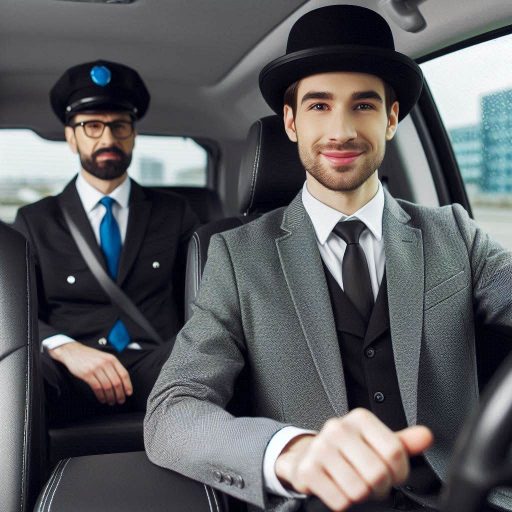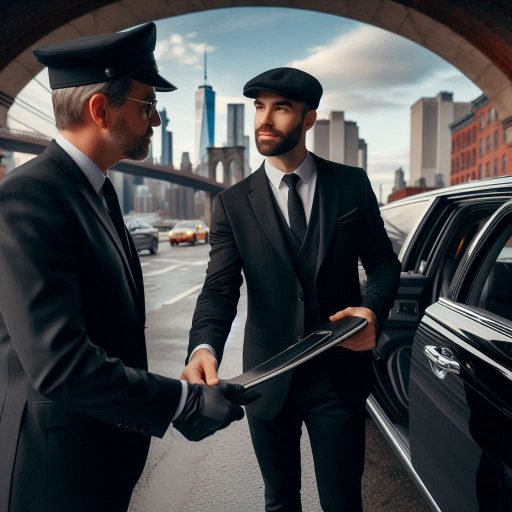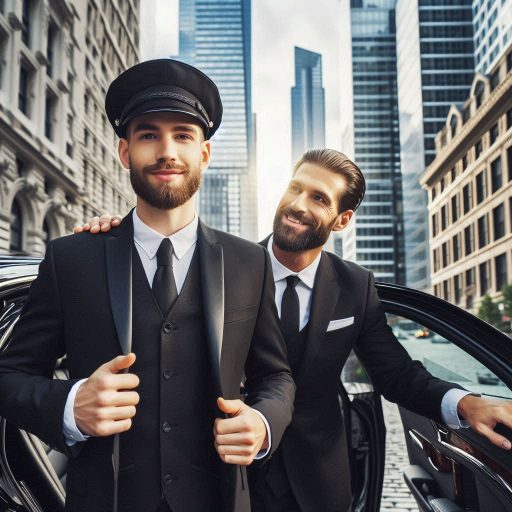Introduction
Chauffeur services provide professional transportation using skilled drivers who prioritize client comfort and safety.
These services have a rich history, evolving from horse-drawn carriages to modern luxury vehicles.
In the early days, wealthy individuals employed chauffeurs to drive their horse-drawn carriages.
As automobiles became more accessible, the demand for chauffeur services grew.
By the early 20th century, chauffeurs were a common sight in urban areas, serving business executives and affluent families alike.
The popularity of chauffeur services increased during the mid-20th century with the rise of corporate travel and tourism.
Companies began to recognize the value of providing professional transportation for their executives and clients.
This led to the establishment of dedicated chauffeur services and limousine companies, offering luxurious vehicles and trained drivers.
Today, chauffeur services continue to evolve with advancements in technology.
Ride-hailing apps and GPS navigation have transformed how people access chauffeur services, making them more convenient than ever.
The history and evolution of chauffeur services reflect changing societal needs, illustrating their ongoing importance in modern transportation.
Understanding this evolution highlights the significance of chauffeur services in today‘s travel landscape, catering to a diverse range of clients and preferences.
Early origins of chauffeurs
Definition of the Term “Chauffeur”
The term “chauffeur” originates from the French word for “stoker.
” Historically, it referred to someone responsible for operating a steam engine.
Over time, the meaning evolved to signify a person who drives a motor vehicle for others, especially in a professional capacity.
Today, chauffeurs provide transportation services, often for business executives, celebrities, and affluent individuals.
Their role extends beyond merely driving; they offer a level of service that prioritizes comfort, safety, and convenience.
Origins Dating Back to the 18th and 19th Centuries
Chauffeur services trace their roots back to the 18th and 19th centuries.
The invention of the automobile revolutionized transportation, making it more accessible to the wealthy.
As automobiles became popular, affluent individuals began hiring drivers to navigate the roads.
Initially, these early chauffeurs drove luxury vehicles equipped with advanced technology of their time.
Wealthy clients employed chauffeurs to manage their transportation needs while allowing them to focus on other responsibilities.
This marked the beginning of professional chauffeur services, which combined driving skills with exceptional customer service.
During the late 19th century, the concept of the chauffeur evolved further.
Cars became symbols of status and wealth, leading more affluent families to hire chauffeurs as personal servants.
Chauffeurs not only provided transportation but also maintained and cared for the vehicles, ensuring they remained in pristine condition.
Chauffeurs as Personal Servants for Wealthy Individuals
In the early 20th century, the role of chauffeurs expanded beyond just driving.
They became essential members of the household staff for wealthy individuals.
These chauffeurs often had specific duties, including maintaining the vehicle, cleaning, and even running errands for their employers.
As the automobile industry advanced, luxury vehicles became more sophisticated.
Chauffeurs learned to operate complex systems, enhancing their value as skilled professionals.
This expertise allowed them to ensure the safety and comfort of their passengers, further solidifying their role in high-society households.
During the mid-20th century, chauffeur services gained popularity in urban areas.
With the rise of corporate culture, businesses began hiring chauffeurs for executives.
This shift marked a significant evolution in chauffeur services, transitioning from personal servants to professional transportation providers.
The history and evolution of chauffeur services reveal their significance in transportation and hospitality.
From their origins in the 18th and 19th centuries to their modern-day role, chauffeurs have adapted to meet the needs of their clients.
Today, they embody a unique blend of driving expertise and exceptional customer service.
As society continues to evolve, so does the role of chauffeurs.
They remain essential for those seeking comfort, convenience, and style in transportation.
Whether serving wealthy individuals or corporate clients, chauffeurs continue to uphold a rich tradition of service that dates back centuries.
Their legacy endures, making them an integral part of luxury travel experiences today.
Read: How to Deal with Pet Grooming Allergies
Chauffeur services in the early 20th century
Rise in Popularity of Automobiles
The history of chauffeur services began with the rise in popularity of automobiles in the early 20th century.
As cars became more accessible, affluent families sought skilled drivers.
The automobile revolution transformed personal transportation and created a demand for professional drivers.
Owning a car was a status symbol, leading to a growing need for chauffeurs.
In the early 1900s, wealthy families began employing chauffeurs to drive their luxury vehicles.
This marked the beginning of chauffeur services as a profession.
The role of the chauffeur evolved from a mere driver to a respected position within households.
Chauffeurs not only transported clients but also maintained vehicles and ensured their cleanliness.
As automobile technology advanced, so did the complexity of driving.
Cars became more sophisticated, requiring drivers with specialized skills.
This shift increased the importance of having trained chauffeurs who understood vehicle mechanics and maintenance.
Consequently, the demand for well-trained chauffeurs surged.
Chauffeurs as Drivers for Upper-Class Families and Businesses
During the 1920s, chauffeur services gained traction among upper-class families and businesses.
Wealthy individuals sought convenience and luxury in their daily travels.
Chauffeurs became essential for attending social events, business meetings, and other engagements.
Their role extended beyond driving; they provided a level of service that reflected their employers‘ status.
In addition to personal use, businesses began hiring chauffeurs for corporate travel.
Companies recognized the benefits of having professional drivers transport executives to important meetings.
This trend solidified the chauffeur‘s position as a vital component of luxury and corporate transportation.
Chauffeurs developed unique skills that set them apart from regular drivers.
They learned the art of customer service, etiquette, and discretion.
Many chauffeurs became familiar with local landmarks and the best routes, enhancing their value to clients.
This expertise established chauffeurs as trusted professionals in the world of transportation.
Need for Chauffeurs with Specialized Skills and Training
As the demand for chauffeur services grew, so did the need for specialized training.
Employers sought chauffeurs who possessed not only driving skills but also knowledge of safety protocols.
Professional training programs emerged, focusing on defensive driving, vehicle maintenance, and customer service.
Chauffeurs learned how to navigate various driving conditions, from city traffic to rural roads.
They also received instruction on handling emergencies and unexpected situations.
This training equipped them with the skills to provide a safe and enjoyable experience for clients.
In recent decades, the evolution of technology has further transformed chauffeur services.
GPS systems and navigation apps have become essential tools for modern chauffeurs.
These advancements allow drivers to provide real-time updates and ensure timely arrivals.
The combination of specialized skills and technology continues to shape the chauffeur industry.
The history and evolution of chauffeur services reflect the changing landscape of transportation.
The rise in popularity of automobiles led to increased demand for professional drivers.
Chauffeurs became integral to upper-class families and businesses, providing luxury and convenience.
The need for specialized skills and training has only grown, ensuring that chauffeurs continue to meet clients’ expectations.
Today, chauffeurs represent a blend of tradition and innovation in the world of personal transportation.
Read: Creating a Comfortable Atmosphere in Your Nail Salon
Evolution of Chauffeur Services in the Mid-20th Century
Increased Demand for Chauffeurs in Urban Areas
The history of chauffeur services reflects the evolution of urban transportation.
As cities grew and populations increased, so did the need for reliable transportation.
Busy professionals sought efficient ways to navigate crowded streets.
This surge in demand led to a rise in chauffeur services, particularly in metropolitan areas.
Chauffeurs quickly became essential for business executives and affluent individuals.
They provided a solution to the challenges of city travel, offering convenience and efficiency.
With their knowledge of local routes, chauffeurs could navigate traffic and ensure timely arrivals.
Urban lifestyles also contributed to the demand for chauffeur services.
As public transportation systems struggled to keep up, private transportation became more appealing.
People valued the comfort and privacy that came with hiring a chauffeur.
This shift transformed chauffeur services into a viable option for daily commuting.
Chauffeurs as Symbols of Luxury and Status
As chauffeur services grew, they became symbols of luxury and status.
Owning a chauffeur-driven vehicle signified wealth and sophistication.
Affluent individuals embraced the convenience of having a personal driver at their disposal.
The image of a chauffeur dressed in a formal uniform added to this perception.
Clients often associated chauffeurs with professionalism and high-quality service.
This status symbol extended beyond private individuals to corporations and celebrities seeking to make a statement.
Chauffeurs offered more than just transportation; they provided an experience.
Their presence elevated events, from corporate meetings to social gatherings.
The luxurious image of chauffeur services contributed to their popularity among the elite.
Introduction of Chauffeur-Driven Limousines for Special Events and Occasions
The introduction of chauffeur-driven limousines marked a significant turning point in the evolution of chauffeur services.
Limousines became synonymous with special occasions, such as weddings, proms, and corporate events.
Their elongated design and plush interiors offered a unique travel experience.
Clients began to associate limousines with celebration and luxury.
Chauffeur services expanded to accommodate these special requests, offering a fleet of high-end vehicles.
Limousines became the go-to choice for those wanting to arrive in style.
This trend led to the growth of specialized limousine services.
Companies focused on providing tailored experiences for various events.
From red carpet arrivals to airport transfers, chauffeurs played a key role in enhancing the overall experience.
Furthermore, the demand for chauffeur-driven limousines fostered competition within the industry.
Companies began to differentiate themselves through exceptional service and unique offerings.
The market saw a rise in themed vehicles, such as vintage cars and luxury SUVs.
The history and evolution of chauffeur services reveal their significance in urban transportation.
Increased demand in urban areas has established chauffeurs as symbols of luxury and status.
The introduction of chauffeur-driven limousines for special events further solidified their place in society.
As chauffeur services continue to evolve, they remain a vital part of the modern transportation landscape, catering to the needs of discerning clients seeking comfort and elegance.
Read: How to Create a Pet-Friendly Grooming Environment

Modern-day chauffeur services
The Shift Towards Professional Chauffeur Companies
The history of chauffeur services has evolved significantly over the years.
Initially, chauffeurs worked as personal drivers for wealthy individuals.
They often used horse-drawn carriages, emphasizing a luxury lifestyle.
With the advent of automobiles, the role of chauffeurs transformed.
Cars became more accessible, leading to a shift in transportation dynamics.
Professional chauffeur companies began to emerge, offering services to a broader clientele.
These companies provided organized, reliable transportation, catering to business professionals and tourists.
The demand for chauffeur services grew as cities expanded and business travel increased.
This shift marked the beginning of a new era in transportation services.
Expanding Clientele: From Luxury to Everyday Transportation
Chauffeur services no longer cater solely to the elite.
Today, they serve a diverse range of clients, including corporate executives, families, and tourists.
This expansion reflects the changing needs of society and transportation trends.
Businesses recognize the value of professional chauffeur services for their employees.
Companies often hire chauffeurs for airport transfers, client meetings, and events.
This convenience allows employees to focus on their work rather than navigating traffic.
Families also appreciate chauffeur services for special occasions.
Whether for weddings, proms, or vacations, professional drivers enhance the experience.
The versatility of chauffeur services has made them more appealing to everyday users.
Moreover, the rise of ride-sharing apps has influenced traditional chauffeur services.
Many professional companies adapted to compete with these platforms by offering tailored services.
This adaptability has allowed chauffeur companies to remain relevant in a changing market.
Transform Your Career Today
Unlock a personalized career strategy that drives real results. Get tailored advice and a roadmap designed just for you.
Start NowIntegration of Technology in Chauffeur Services
The integration of technology has significantly transformed chauffeur services.
In the past, booking a chauffeur involved phone calls or in-person arrangements.
Today, clients can easily book services through websites and mobile apps.
These technological advancements streamline the booking process.
Clients can view vehicle options, compare prices, and read reviews at their convenience.
This accessibility makes it easier for users to choose chauffeur services that meet their needs.
Additionally, technology has enhanced communication between drivers and clients.
Real-time tracking allows clients to monitor their chauffeur‘s arrival.
This feature provides peace of mind, knowing exactly when to expect their ride.
Payment options have also evolved, with many companies offering cashless transactions.
Clients can pay through apps, credit cards, or digital wallets.
This convenience caters to modern preferences, making the payment process seamless.
Furthermore, data analytics helps chauffeur companies improve their services.
By analyzing client feedback and usage patterns, companies can identify areas for improvement.
This commitment to customer satisfaction ensures a continually evolving service.
The history and evolution of chauffeur services reflect changing societal needs and technological advancements.
The shift towards professional chauffeur companies has broadened the range of clients they serve.
Today, technology plays a crucial role in enhancing the booking experience and service efficiency.
As the industry continues to evolve, chauffeur services remain a vital part of modern transportation.
This adaptability ensures their relevance in a dynamic landscape.
Read: Nail Technician Networking: Building Industry Connections
Challenges and changes in the industry
Competition from Ridesharing Services Like Uber and Lyft
The history and evolution of chauffeur services have faced significant challenges in recent years.
Ridesharing services like Uber and Lyft have revolutionized the transportation industry.
These platforms offer convenience and affordability, attracting a large customer base.
As a result, traditional chauffeur services have experienced increased competition.
Ridesharing apps provide an easy way for users to request rides at their fingertips.
This accessibility appeals to many travelers, particularly those seeking quick transport.
Chauffeur services must now compete not only on service quality but also on pricing.
To stay relevant, many chauffeur companies have begun to adopt technology.
They implement booking apps to streamline the reservation process.
By offering similar conveniences, they aim to retain clients who might otherwise choose ridesharing services.
Impact of the COVID-19 Pandemic on Chauffeur Services
The COVID-19 pandemic significantly impacted chauffeur services worldwide.
During the early stages of the pandemic, demand for transportation plummeted.
Many corporate events and travel plans were canceled, leading to a decline in business for chauffeurs.
Health and safety concerns prompted clients to reconsider their travel options.
Social distancing guidelines and lockdowns made it difficult for chauffeur services to operate.
Many companies faced financial strain and had to adapt quickly to survive.
As travel restrictions eased, chauffeur services began to adapt to new demands.
Enhanced sanitation protocols became crucial in regaining client trust.
Chauffeurs implemented rigorous cleaning measures to ensure passenger safety during rides.
Efforts to Adapt and Innovate in Response to Changing Demands
In response to changing demands, chauffeur services have embraced innovation.
Companies started offering flexible cancellation policies to accommodate clients‘ uncertainties.
This change has helped reassure clients hesitant to book travel.
Chauffeur services also diversified their offerings to attract new clientele.
Some companies expanded into luxury vehicle rentals or specialized transportation services.
By catering to various needs, they aim to capture a broader market.
Additionally, many chauffeur services have enhanced their online presence.
They invest in user-friendly websites and booking platforms to simplify reservations.
Increased engagement on social media helps connect with potential clients and boost brand visibility.
The focus on exceptional customer service remains a priority.
Chauffeurs are trained to provide a personalized experience, setting themselves apart from ridesharing services.
By emphasizing professionalism, they create lasting impressions on clients.
Essentially, the history and evolution of chauffeur services reflect the changing landscape of transportation.
Competition from ridesharing services has forced traditional chauffeur companies to adapt.
The COVID-19 pandemic further accelerated the need for innovation and flexibility.
Through strategic efforts, chauffeur services continue to evolve and meet the demands of today‘s travelers.
Their commitment to providing exceptional service ensures their relevance in a competitive market.
Learn More: Technological Innovations in Pest Control Services
Gain More Insights: Best Practices for Tour Guide Customer Service
Future trends in chauffeur services
Eco-Friendly and Luxury Vehicles
The history of chauffeur services reflects broader changes in society and technology.
Today, there is a strong emphasis on eco-friendly vehicles.
Many chauffeur companies are adopting hybrid and electric vehicles to reduce carbon footprints.
Clients increasingly demand environmentally conscious options that align with their values.
Luxury vehicles remain a hallmark of chauffeur services.
High-end brands continue to dominate the market, offering comfort and style.
Chauffeur services provide clients with a premium experience, combining elegance with eco-friendliness.
As more luxury car manufacturers develop electric models, this trend is likely to grow.
Eco-friendly vehicles are not just a trend; they represent a shift in consumer preferences.
Clients are more informed about their environmental impact than ever before.
Chauffeur services that prioritize sustainability attract a growing customer base.
The combination of luxury and eco-consciousness enhances the overall appeal of chauffeur services.
Potential for Autonomous Vehicles to Change the Industry
The evolution of chauffeur services also includes advancements in technology.
Autonomous vehicles present a potential revolution in the industry.
Self-driving technology promises to enhance safety and efficiency for passengers.
This innovation could reshape how chauffeur services operate in the future.
Many companies are investing in research and development for autonomous driving systems.
As technology improves, we may see these vehicles integrated into chauffeur fleets.
However, significant regulatory and safety challenges remain before widespread adoption.
Despite the potential benefits, the human touch in chauffeur services is irreplaceable.
Professional chauffeurs provide a personalized experience that automated vehicles cannot match.
Clients value the relationship they build with their chauffeurs, emphasizing the importance of human interaction.
Continued Importance of Personalized and High-Quality Service
While technology evolves, the essence of chauffeur services remains rooted in personalized service.
High-quality service is crucial for retaining clients and enhancing their experience.
Chauffeurs are trained to cater to individual preferences, ensuring each ride is memorable.
Clients appreciate when chauffeurs remember their preferences, such as preferred routes or favorite drinks.
This attention to detail distinguishes luxury chauffeur services from other transportation options.
The bond between chauffeur and client enhances the overall experience, fostering loyalty.
Additionally, chauffeur services must adapt to changing client expectations.
As new generations embrace travel, their priorities differ from those of past clients.
Younger clients often seek seamless experiences, demanding tech-savvy services without sacrificing quality.
In the end, the history and evolution of chauffeur services highlight key trends shaping the industry today.
Eco-friendly and luxury vehicles are becoming essential components of modern fleets.
Meanwhile, autonomous vehicles present exciting possibilities for the future, although human interaction remains crucial.
Personalized, high-quality service continues to be the foundation of successful chauffeur services, ensuring client satisfaction and loyalty.
As the industry evolves, maintaining this commitment to exceptional service will remain paramount.
Conclusion
Chauffeur services have a rich history dating back to the early 19th century.
Initially, wealthy individuals employed drivers for horse-drawn carriages, emphasizing status and luxury.
As the automotive industry grew, the role of chauffeurs evolved alongside the introduction of motor vehicles.
In the early 20th century, chauffeur services became synonymous with elegance and sophistication.
High-end vehicles signified wealth, and chauffeurs provided personalized transportation for elite clientele.
This era established a standard of professionalism and service that still defines the industry today.
Chauffeurs play a vital role in providing luxury transportation, ensuring clients enjoy comfort and convenience during their travels.
Their knowledge of routes and commitment to punctuality enhance the overall travel experience.
This attention to detail and personalized service remains a cornerstone of the industry.
The enduring appeal of chauffeur services lies in their ability to adapt to changing trends.
Today, clients seek both luxury and reliability, making chauffeur services an attractive option for corporate and leisure travelers.
As technology advances, the future of chauffeur services looks promising, with innovations like app-based bookings and electric vehicles.
This evolution will continue to shape how clients experience luxury transportation, ensuring chauffeurs remain an essential part of travel.




